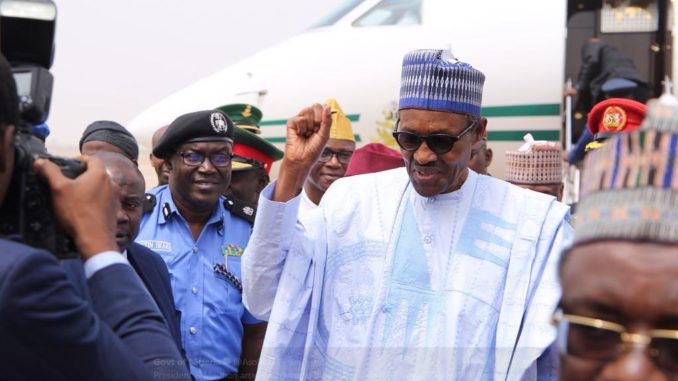
Nigerian President Muhammadu Buhari’s bid for re-election next year could hinge on the swing states of the country’s “Middle Belt”. Worryingly for him, a surge in violence there and rising food prices are chipping away at his support.
The 75-year-old former military ruler declared this week that he would seek another term, ending months of speculation about his future after bouts of ill health. His candidacy still depends on party approval, which is seen as a formality.
He was responding to public “clamour” to run again, his spokesman said, but among those caught up in clashes between semi-nomadic herdsmen and settled farmers in the central Benue state there was little sign of enthusiasm.
“We will look for someone who is fit to protect lives and property in Nigeria,” said Philip Usartse, a farmer who fled with his family when armed herdsmen attacked their village in January, leaving corpses and burnt houses in their wake.
“We are going to fish him out of that office,” the 42-year-old added.
At stake is the leadership of Africa’s top oil producer and most populous nation that is central to regional stability as it battles Islamist militants concentrated in the northeast.
During Buhari’s presidency, the Boko Haram insurgency has lost most of the territory it held, but it still carries out suicide bombings and kidnappings.
Buhari’s party, the All Progressives Congress (APC), says he is the person to modernise refineries and roads and stimulate agriculture to wean Nigeria off its dependence on oil.
But the main opposition People’s Democratic Party, which has yet to choose its candidate, says Buhari’s protectionist policies have stifled growth, and fuelled joblessness, unemployment and crime.
MASS DISPLACEMENT
Hundreds of people have been killed this year in the Middle Belt, and Usartse, his wife and four children are among an estimated 35,000 people living in the Abagena camp on the outskirts of Benue state capital Makurdi.
The sprawling camp, where generations of the same family share mats to sleep and flies swirl around weary children, is a visible product of the clashes. So too was the public mourning in the city in January when it held mass burials of 73 people killed in the first few days of 2018.
Communal violence over dwindling fertile land in the Middle Belt, a resurgence in attacks by Boko Haram and a fragile ceasefire by militants in the oil-rich southern Niger Delta have turned security into a weakness for Buhari.
In the Middle Belt, fragility on an issue that was previously a source of political strength is in part due to accusations that he has not cracked down on herdsmen because they are from his Fulani ethnic group.
The presidency has denied that assertion, and extra police were deployed to the state earlier this year in response to the violence.
In a statement late on Wednesday, Buhari said “irresponsible politics” had been brought into the communal violence, but solutions would be found and justice done to all concerned.
SWING STATES
Buhari contested both the 2011 and 2015 elections against then president Goodluck Jonathan, a Christian from the south.
Seven years ago, Buhari – a Muslim from the north – was defeated after winning in the northern states while Jonathan was victorious in the south and central states.
Buhari won in 2015, becoming the first candidate to defeat an incumbent president, in part because he gained votes in the Middle Belt, where the predominantly Muslim north and Christian south collide.
“The region includes several states that are likely to be hotly contested, including Plateau, Taraba, Nasarawa and the Federal Capital Territory, which the PDP won by margins ranging from three percent to 12 percent in 2015,” said Ben Payton, head of Africa research at Verisk Maplecroft.
In 2011, 694,776 people voted for Jonathan in Benue state and 109,680 backed Buhari. But support for Buhari surged in the state in 2015, where he secured a narrow victory with 373,961 votes to Jonathan’s 303,737.
The Middle Belt states could play a key role again in a tight race, but Buhari’s stronghold will remain the north and he is unlikely to make inroads in the south, said Malte Liewerscheidt, west Africa analyst at Teneo Intelligence.
“The southwestern region will again prove crucial in deciding the election,” he said, pointing to the coalition that created the ruling APC by enlisting political godfathers in the southwest to bolster northern votes.
“Provided the APC’s constituent parts stay together the party will be very difficult to beat, even though Buhari’s popularity has certainly suffered,” said Liewerscheidt.
DISAPPOINTMENT
In Wurukum market, a bustling labyrinth of stalls selling goods ranging from fruit and vegetables to fabric and livestock in Makurdi’s city centre, some who backed Buhari three years ago gave a damning assessment of his tenure.
“It is not what we expected. People are disappointed,” said stall holder Jecintha Eze, 38, of Buhari’s first term, during which the economy fell into recession for the first time in 25 years before emerging from the downturn in early 2017.
“I’m not going to vote for anybody again because we put hope in people a lot in Nigeria, but in the end we are disappointed,” she said, pointing to high unemployment and galloping food prices.
Data this week showed annual inflation in March hit the lowest level in two years, although food inflation remained high at 16.1 percent.
Cletus Dzeremo, who buys and sells wholesale goods, said he did not vote for Buhari in the last election and nothing would encourage him to support the president.
“The economy is not balanced. People are suffering from left to right … and in terms of security he has not done enough.”
But not everyone had given up on Buhari. Market trader Christiana Terdoo said she voted for him in the last election and would do so again.
“I will still vote for him because maybe he will change,” she said.